|
|
|
Sort Order |
|
|
|
Items / Page
|
|
|
|
|
|
|
| Srl | Item |
| 1 |
ID:
164300
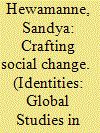

|
|
|
|
|
| Summary/Abstract |
This article explores how former factory workers negotiate new identities in villages, as new brides, mothers and daughters-in-law, after 5–6 years of employment in an urban Free Trade Zone. I argue that their performances of self-discipline and disavowal of transgressive knowledges allow them to make use of the limited social, economic and political spaces available while gradually reshaping local understandings about the good daughter-in-law. Former workers’ strategic deployment of social conformity represents the foundation on which their entry into village social, economic, political spaces is based on. Although individual social conformity would conventionally be identified as everyday politics, I argue that former workers’ performance of self-discipline and social conformity is strategic and leads to changes in gender norms and village social hierarchies and thus represents a form of politics that is in between everyday and transformative politics – politics that creates conditions of possibility for social transformations.
|
|
|
|
|
|
|
|
|
|
|
|
|
|
|
|
| 2 |
ID:
118019
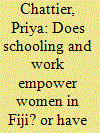

|
|
|
|
|
| Publication |
2013.
|
| Summary/Abstract |
The paper explores the limitations of the theoretical presumptions underlying the relationship between empowerment, education and employment that have been emphasized in both the existing literature and the current rhetoric to 'empower' women in developing countries. The research uses findings from in-depth interviews and focused group discussion data to empirically examine the relationship between schooling, paid work and empowerment of women in Fiji. The paper argues that the relationship between education, work and empowerment is conditioned by gender norms surrounding women's and men's choices on key economic decisions. The findings demonstrate that cultural norms about gender roles are considered to persist, generating gender inequality despite women's and girl's education and employment. Empirical evidence makes a strong case for the need to move away from broad-based conceptualizations of women's empowerment to an analysis of the social construction of gender as both a conceptual and an empirical category of inquiry.
|
|
|
|
|
|
|
|
|
|
|
|
|
|
|
|
| 3 |
ID:
178468
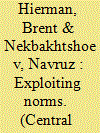

|
|
|
|
|
| Summary/Abstract |
This article advances a straightforward argument: a complete analysis of land reform processes in Central Asia needs to account for gender dynamics. More explicitly, it argues that alongside the feminization of agriculture, customary gender norms restricting female economic opportunities and property acquisition represent a structural advantage for local elites interested in hindering or delaying the process of farm individualization in Tajikistan. After overviewing the gap between female legal rights to agricultural land and the actualization of these rights in four Central Asian states (Kazakhstan, Kyrgyzstan Tajikistan and Uzbekistan) the article narrows its focus to Tajikistan. After regression analyses reveal that gendered information gaps are insufficient to account for gaps in the registration of farmland, the study presents qualitative data examining the relationship between female-headed households and the slow pace of agrarian change in Tajikistan.
|
|
|
|
|
|
|
|
|
|
|
|
|
|
|
|
| 4 |
ID:
182758
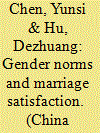

|
|
|
|
|
| Summary/Abstract |
This paper examines the association between the traditional gender division norm — “men are breadwinners, and women are homemakers” — and the marriage satisfaction of each gender using Chinese couple-level data. The results reveal that married couples tend to be less satisfied with their marriage if the wife earns more than the husband. Moreover, it seems that the drop in the husband's marriage satisfaction matters more for the drop in the couple's overall marriage satisfaction. By exploring the difference between husbands and wives in their attitudes in terms of economic contribution and housework contribution, we confirm that husbands may have a specific self-image regarding the traditional gender division norm, and can also respond to the wives' gender role preference.
|
|
|
|
|
|
|
|
|
|
|
|
|
|
|
|
| 5 |
ID:
170266
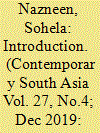

|
|
|
|
|
| Summary/Abstract |
Questions of women's power remain a matter of heated debate globally, but take on a heightened intensity in a South Asia featuring rapid economic growth and structural transformation in recent decades. This Special Issue aims to improve understanding of how the women of South Asia are gaining and exercising power and of the obstacles and backlash they face, moving beyond discussion of women's empowerment as a matter of control over domestic economic resources or labour market participation. Articles from Bangladesh, India, Nepal, and Pakistan examine the struggles of garments workers in global value chains, middle class professionals, subsistence farmers and wage labourers, tracing the actors, institutions, and movements that build or block women's pathways to power. Collectively, the articles argue for paid work to be treated as a critical arena for struggles over women's power, not an end in itself. They draw attention to the roles of states and patriarchal forces in building or blocking pathways to power, and to the resilient nature of gendered norms that serve patriarchy. And they highlight the need for research into women's empowerment to focus on key episodes of political contention, as critical junctures for the progress – or retreat – of women's empowerment.
|
|
|
|
|
|
|
|
|
|
|
|
|
|
|
|
| 6 |
ID:
116544
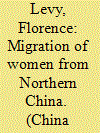

|
|
|
|
|
| Publication |
2012.
|
| Summary/Abstract |
Since the late 1990s, a little-known wave of Chinese migrants has been making its way to France. Coming from regions with no tradition of international mobility, it differs from classic migratory flows in that it consists mainly of urban middle-class women in their forties who are affected by the reform policy. Drawing on the point of view of these female migrants regarding developments in the job market, their economic resources, and changes in family relations, this article examines the transformations in social norms and gender roles that affected these people before their departure. It considers whether these developments have had an impact beyond China's borders, and whether they may have influenced the gender configuration of this migratory flow making its way to Europe.
|
|
|
|
|
|
|
|
|
|
|
|
|
|
|
|
| 7 |
ID:
173197
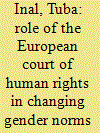

|
|
|
|
|
| Summary/Abstract |
The diffusion of international human rights norms through the enforcement of international human rights law by courts has been explored by both scholars of international relations and international law. Turkey, which has been a state party to most international human rights treaties despite being a major violator of human rights, is the case in this paper. It examines norm diffusion in the area of women’s rights through court action in a patriarchal culture protected and represented by a deeply patriarchal state and judiciary. By looking at the legal processes, domestic and international, through which the issue of the right of Turkish women to keep their maiden names after marriage has gone, this paper argues that norm diffusion through court action can be triggered even in difficult cases such as changing gendered norms and describes the conditions and mechanisms that make these changes more likely.
|
|
|
|
|
|
|
|
|
|
|
|
|
|
|
|
|
|
|
|
|